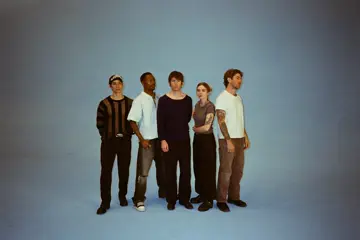The best Meshuggah record was and still is 'ObZen'.
Let's not pretend: Meshuggah have some great records throughout their highly influential career. ‘Destroy Erase Improve’ (1995), 'Chaosphere' (1998) and ‘Nothing’ (2002) are definite standout records for progressive and extreme music, as well as just metal music in general.
You can clearly plot out the mechanic tendrils of Meshuggah's widespread, innovative influence rooting themselves into the many that followed them. From Periphery, Monuments, SikTh, TesseracT, Between The Buried And Me, Textures, Animals As Leaders, Frontierer, Arteries, to even Northlane, The Tony Danza Tap Dance Extravaganza and The Dillinger Escape Plan.
Yet the defining, undisputable go-to record amongst Meshuggah’s career - the sole release that fully cemented their legacy and impact - is 2008’s mighty ‘ObZen’. The group’s masterful sixth record and their last great album recently turned the big 1-0 and while its decade-long age might make it a “throwback” or any other kind of nostalgic descriptor, it’s still their most consistent and most accomplished work to date. I know it, you know it, we all fucking know it!
‘ObZen’ nailed that sweet spot between the old and the new Meshuggah. It did so by expertly mixing up the earlier groove and thrash metal elements from their debut 'Contradictions Collapse' (1991) and 'Destroy Erase Improve' with their stop-and-go riffing style and progressive, jazzier undercurrents. Not stopping there though, via this sixth record, the band bridged said parts over to the down-tuned, math-metal extremities of the 'Nothing' and 'Catch Thirtythree' (2005) era while also doing away with the trepid experimentation of the past. All while somehow twisting and amplifying their deformed, monstrous sound to become even heavier than what it already bloody was. As if it was in any way possible to do so, the utter madmen.
Don't miss a beat with our FREE daily newsletter
Meshuggah really did pull out everything from their bag of tricks for this album. With a more aggressive pace, their solid polyrhythmic and polymetric tendencies were all utilised superbly well, and the band's melodically distant approach was at its most effective here too. The group's immense syncopation, harsh song timbres, massive grooves, and wall-of-sound-like texture were at their strongest as well. So too was how the music and the rhythms felt as complex and chaotic as ever but how the band also managed to keep these aspects all followable. It's that kind of duality that makes 'ObZen' click better than their other albums. In saying that, this 2008 effort isn't all that dissimilar from what the band did before it and after the fact. But the only key difference is that 'ObZen' was by far the best replication of that sound.
[caption id="attachment_1101448" align="alignnone" width="680"] Meshuggah, circa 2008.[/caption]
Meshuggah, circa 2008.[/caption]
Individually, the five band members of Meshuggah were writing at their peak on 'ObZen'.
The ways in which Fredrik Thordendal's and Mårten Hagström's hammering, gut-churning guitar riffs freaked out beyond the rest of the mix and instrumentation was frightening. Plus, how their guitar work would often follow the pounding and expertly metronomic drums of Tomas Haake - a defining staple of the band's sound - was also at its best here. Due to a fast-approaching deadline for their previous release, the too-big-for-its-own-good 'Catch Thirtythree', the drum and bass tracks were all tracked and produced digitally via computer software. (Which while not bad, I think is now pretty apparent when you hear that record in retrospect). With bassist Dick Lövgren joining the band in 2004, he actually wasn't able to play on their fifth album because of these time constraints, but he was able to on 'obZen' and it really shows with his bass playing giving the record a whole new layer and a new dimension of heaviness. Then there's Jens Kidman's powerful, almost-over-bearing vocals that dominate the mix completely. And when you couple the frontman breathing demonic life into Haake's existentialist and esoteric lyrics about physiology and psychology, it makes for such an indomitable combination.
Then there are the record's nine songs and my lord, what a killer batch of songs these nine are!
The fast, four-minute metal attack of crunchy opener ‘Combustion’ is just pure sonic destruction and one of the band's best songs. The booming assault of heavy low-end in the brutal 'Electric Red', with those ominous leads and the song's eerier dynamic moments (that offer you shelter from the on-going metal storm outside), is as well- balanced as Meshuggah could ever get at that point in time. And it worked. The record's third song, the bludgeoning ‘Bleed’, was and is a game-changing composition for extreme and progressive metal due to its utterly relentless pace, punishing approach to rhythm and drumming, and just the high musical proficiency required to perform it well. 'Bleed', and it's frantic double-kick rhythms that every drummer worth their salt had to learn, really is a modern-day classic for this kind of metal; it's Meshuggah's "banger" in many ways. Without it, this record wouldn't be as good - FACT.
The stomping, slower pace of the fittingly titled 'Lethargica' is the stuff of down-tuned dreams, and that faint guitar bridge section in the middle is the perfect connection between points A and B. And when it ends, and the band swing back into place at once, it's like a shovel right to your fuckin' face. The title track is easily one of the release's heaviest slabs, which is really saying something given who this band is and what they're so well known for. The tectonic, brooding darkness of 'This Spiteful Snake' and it's sickly calculated tapped solo to the contrastingly eerie yet abrasively surgical 'Pineal Gland Optics' punctuates the back-end of 'ObZen' in such a consistent manner. The same can be said of the slicing, downstroke riffs in 'Pravus', which are just goddamn deadly. The way how this piece shifts across various tones and tempos is executed so well, and 'Pravus' has got to be one of Meshuggah's bonafide mosh tracks. While some might consider that a cheap or "simple" label for the song, I think that that works in both the band's and record's favour to have something a little bit more straightforward.
Then it all comes to an end: the nine-and-a-half-minute long, stamina-destroying monster of closer 'Dancers Of A Discordant System' which is one hell of a climax, to put it lightly. The song slithers along and then suddenly decimates its way through various movements; from that creepy-as-hell intro riff, Jens' sinister whispered vocals, to the huge drum grooves and guitar chug combos and that swirling, proggy guitar solo near the end. For Meshuggah to deliver a near ten-minute behemoth that summarises the previous points in the album that lead up to this final moment and to make it flow so well together without losing steam is a real achievement.
[caption id="attachment_1089946" align="alignnone" width="760"] Meshuggah, 2017.[/caption]
Meshuggah, 2017.[/caption]
Looking back on the hulking beast of 'ObZen' now in March 2018, I've noticed that its creeping shadow casts over the follow-up two records more so than ever before. It just has the band's best songs whereas the other's do not. For this sixth record just hits you in a way that much of the group's other material just doesn't; striking the perfect artistic dynamic between their decidedly human and otherworldly musical elements.
Sure, 2012’s slower ‘Koloss’ was fine enough when it dropped six years ago and it has some solid songs to its name, for sure ('Do Not Look Down' and 'Break Those Bones Whose Sinews Gave It Motion' come right to mind). Yet I distinctly remember feeling underwhelmed whenever I listened to it. Even to this day. It really seemed like Meshuggah had more than outdone themselves with its acclaimed predecessor and the follow-up just couldn’t quite hack it. Although, instrumental ambient guitar closer ‘The Last Vigil’ is one of the best pieces of music they've ever released due to how different, serene and how melodic it was.
While 2016's decent at best ‘The Violent Sleep of Reason’ had its moments – especially with the record being impressively recorded live, a feat in of itself – it’s just such a repetitive and borderline-boring record. Despite the more organic sound, it sadly carries over the weakest songwriting parts from Meshuggah's often monotonous sound, to the point of real detriment. Yet, that's always been their musical intent, isn't it? To replicate a bitingly cold, repetitive and bleak dystopian metal hellscape that's akin to an inhospitable factory or actual blunt-force trauma on each new album. And that's fine, but the very sound that Meshuggah helped cultivate grew beyond them in some ways; what they helped to start eventually overtook them. But just try telling the band's die-hardest sycophantic fans that. (If you wanna see some of their fans in full whingey, meltdown mode, scroll down through the comment sections of The Needle Drop's review of 'The Violent Sleep Of Reason' for some cringes and some laughs).
I mean, come on, very few are going to drop $40-60 wanting to see Meshuggah mainly play 'Born In Dissonance' or 'Clockworks'. No - they're paying money to go see older songs 'Bleed' and 'Combustion' get sonically constructed right before their eyes.
Perhaps the saddest thing about the sheer strength of ‘ObZen’ is that as these guys have such a specific sound and such a clear goal in mind when they write and record an album, they may never ever top this sixth LP for as long as their esteemed career continues on. Of course, the flip side there is that Meshuggah still created one of metal’s most important records of the 21st century - 'ObZen'.
Fucking listen to it:
















